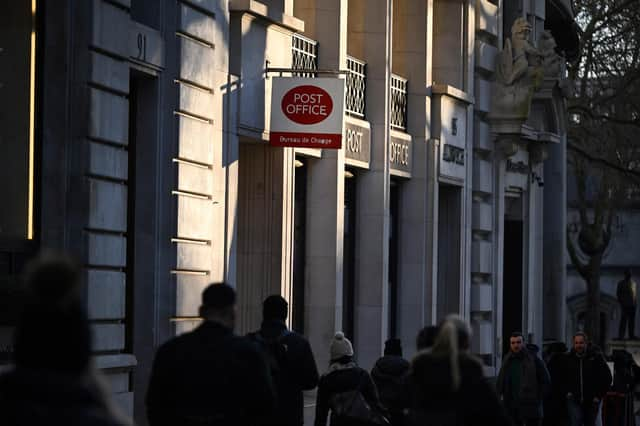Ian Ellis: Post Office IT scandal is a David versus Goliath tale


The series has led to urgent action by the government to make right a terrible injustice suffered by good and decent people wrongly accused of theft and false accounting, both exonerating and compensating them.
May the job be done to the victims' complete satisfaction.
As this newspaper has reported (NI postmasters to be part of plan, January 11), the government has said it wants to work with the authorities in Northern Ireland to ensure that Post Office branch managers here, who were wrongly convicted in the scandal surrounding Fujitsu's faulty Horizon computer system used by the Post Office, have their names cleared.
Advertisement
Hide AdAdvertisement
Hide AdIn his 527-page definitive account of the tragic saga, “The Great Post Office Scandal” (Bath Publishing, 2021), broadcaster and investigative journalist Nick Wallis documents what he describes as “the heroics of those who fought long and hard against a powerful and well-resourced opponent to get the truth into the public domain”.
Wallis recounts how in 2004 campaigner Alan Bates's “Post Office Victims” website “was the only source of any public criticism of the Post Office Horizon system”.
Subsequently, the publications Computer Weekly and Private Eye - as well as the BBC and the campaigning former Conservative MP now Lord Arbuthnot - would play their part in bringing the situation to public attention, but it was the recent ITV drama that brought the swift action that was needed.
The BBC has reported that in the lead-up up to the 2015 broadcast of its Panorama programme, “Trouble at the Post Office”, experts interviewed by the broadcaster “were sent intimidating letters by Post Office lawyers about their participation in the programme”, adding that “the Post Office continued to spread misinformation” over issues concerning remote access to the Horizon system.
Advertisement
Hide AdAdvertisement
Hide AdThe report went on to state that while one of the Post Office's lawyers told the High Court in 2019 that it was “a matter of enormous regret that the senior managers who dealt with Panorama were not aware that remote access to Horizon was possible”, documents obtained by Panorama for a follow-up programme in 2020 “show the Post Office had known it was possible for years”.
The BBC said the Post Office declined to comment on the matter while the public inquiry into the whole debacle is ongoing.
However, Post Office CEO from 2012-2019 Paula Vennells has said: "I am truly sorry for the devastation caused to the sub-postmasters and their families, whose lives were torn apart by being wrongly accused and wrongly prosecuted as a result of the Horizon system."
Yesterday, Fujitsu's European chief executive Paul Patterson told MPs that there had been “bugs and errors” in the Horizon system and that the firm has a moral obligation to contribute to a redress scheme. On behalf of Fujitsu he apologised for the part the company played in what he described as “this appalling miscarriage of justice”.
Advertisement
Hide AdAdvertisement
Hide AdMs Vennells, who has returned her CBE honour for services to the Post Office and charity, and who has stood down from her post as a non-stipendiary minister in the Church of England, has said that she now intends “to continue to focus” on assisting the ongoing inquiry.
The inquiry, which was established in non-statutory form in 2020 but became a statutory inquiry in the following year, is led by retired high court judge Sir Wyn Williams.
Perhaps if in future there were more software engineers involved in actual governance and high-level administration there might be a more ready understanding in those corridors of power of the actual dangers of computer systems.
It surely saddens the public to see a national institution, otherwise seen as a reassuring presence in every community, brought into such focus.
Advertisement
Hide AdAdvertisement
Hide AdI do not think any less of my local post office because of what has transpired. Those who serve behind the counter are busy but always helpful and indeed cheerful.
The postman who delivers my post is similarly and unfailingly courteous and good humoured.
No, it's not about those people. The Post Office scandal is about corporate individuals who seem to have cared more for their system than for the very people who operated it on the ground.
There is a striking contrast between the ordinary people in their local postal businesses and certain individuals who worked for the Post Office centrally and at Fujitsu.
Advertisement
Hide AdAdvertisement
Hide AdImmediately, a certain biblical parallel comes to mind - the encounter between David and Goliath.
It is a reassuring passage because it tells us what history often has shown, namely, that while misrule may have its day, deliverance is always possible.
The churches also are powerful institutions but, while they stand for high moral standards, those who serve in them can be tempted into placing the avoidance of reputational damage to their institutions above proper openness and accountability.
As religious bodies, they gain trust and respect, but the sober reality is that in fact they are not immune to the same kind of self-interest found in secular corporations.
Advertisement
Hide AdAdvertisement
Hide AdThe paradox is that any attempted cover-ups, whether in secular or religious institutions, can end up doing infinitely more damage than would have occurred if wrongdoing had been admitted and confronted in the first place.
Canon Ian Ellis is a former editor of The Church of Ireland Gazette.